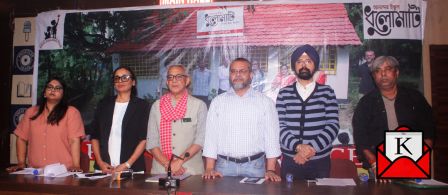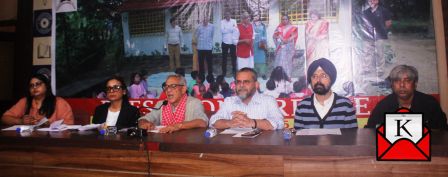500 Rural Play Schools To Provide The Best Childhood Education


Adhiti Education Trust, a farmers’ organization founded to provide the best early childhood education and activity-based learning to rural primary, middle, and secondary school students from families of farmers and farmworkers at no cost, held a press conference at the Kolkata Press Club.
Farmer Leader Avik Saha, Managing Trustee of the Trust, and all other trustees, namely Tejvinder Singh Chattha (Rural Business Entrepreneur), Abhijit Banerjee (Social Activist), Jayati Saha (Advocate of Calcutta High Court) and Tapas Kar (Social Activist) along with Ms. Pritha Ray, Academic Director of the Trust, graced the event.
Avik Saha said “The trust’s activities are inspired by Mahatma Gandhi’s Gram Swaraj, which envisioned villages as economic and social growth centers. However, due to policy misdirection, lack of political will, and shortcomings in implementation, no visible change has been seen in the village economy. The focus is on education, particularly for children in villages who are denied early childhood learning. Play schools and activity centers have been opened in Purulia, Bankura, Birbhum, and North 24 Parganas to address this. Over 1300 rural children now have access to play-schools, and the number is set to increase to 500 by the end of 2025. Over 100 local women have been trained to become teachers, earning respectable salaries and becoming financially independent. Activity centers aim to fill the gap in reading, writing, speaking, and arithmetic skills, and teachers are trained to speak English as a language. Pedagogy and curriculum are being developed on an ongoing basis, and children of brickfield workers who have zero access to education are now given their right to education. This is a revolution in education, aiming to create equality of access to education for all children in Bengal”.
Abhijit Banerjee said “English is a crucial language in India, as it allows those who can speak it access the highest standards of life and livelihood. However, many students in government schools struggle to compete with those educated in English medium schools. To address this, a teacher training course has been launched, with the first batch of 10 teachers starting their training. The goal is to have all teachers be able to use basic spoken English in classes by the end of the year, allowing children to learn to speak English through hearing. The school is not promoting English medium schools, but rather promoting learning through the mother tongue. English is a language of connectivity and is used in higher education, government offices, and the Supreme Court. By knowing English, children can connect with half the world that speaks English, making it a great differentiating factor in schools and an equalizer. Teachers who can speak English will pass it on to students, ensuring the Indian divide between English-speaking and non-English-speaking students ends soon”.
Avik Saha concluded by saying that the trust’s initiatives supplement government initiatives through ICDS, focusing on teacher training programs for village-based expert teachers in early childhood education. Every school is opened with full community participation and equal input, with villagers providing all physical infrastructure free of cost. The concept demonstrates that with minimal effort, a village can develop through children’s access to high-quality education and women’s training, employment, and financial independence, promoting holistic community development.
Priyanka Dutta
